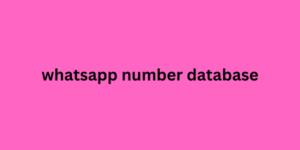Also, a website is your own property and has a unique digital address. You can design and publish anything you want to, and your clients can easily find you. And there are even more benefits of having a professional website for your freelance business.
In this guide, I’ll share an easy method to whatsapp number database create your freelance website in a few minutes without coding.

Benefits of having your own freelance website
Personal branding
Every freelancer has their own style and something different to offer. This is the unique value proposition to build your personal brand around. And a website is the best way to do that because it represents your personality the way you want.
You can show examples of your past work, publish success stories, and the results you deliver to your past/existing clients. It will show you as an expert in your field. You can place endorsements and testimonials for social proof and trust signals. You can show your personality, share your hobbies, photos of your cat/dog, or do anything else that you want.
Better visibility
Having a website gives you complete control over how you present yourself. When a potential client finds you somewhere and wants to know more about your skills, experience, and personality, nothing can be better than having a professional website showcasing your skills, expertise, etc.
Establish yourself as an expert and make a good impression that’ll increase your chances of customer acquisition.
Add your website URL in your social media posts, bylines, ebooks, etc. It will help others to know how to reach out to you.
Portfolio
It’s pretty challenging to get clients without having a solid portfolio. Examples of previous work are more trustworthy than just words. When you have a solid portfolio to show your expertise, your work speaks for you.
You’ll get the right kind of clients who need your services and work with you for the long term because they can understand your style before hiring you.
Lead generation
The most challenging part of starting your journey as a freelancer is to get new clients. But if you don’t have any prior experience, it becomes even more difficult to get them.
That’s why many newbie freelancers try different ways to get new clients like bidding sites, cold email outreach, etc. With lots of effort, they get low-paying clients.
When you have a website for your freelance business, you can promote your business with marketing strategies like SEO, content marketing, and marketing funnels. You can pretty easily automate your lead generation. There is no need to put lots of time into finding potential clients and reach out to them – they will reach out to you to get your services.
Build a sustainable business
Your website plays an essential role in building the reputation that gets new leads. A well-designed and maintained website representing your personality and values will convince potential clients that you are worth your charges. All these factors help you build a sustainable business. A website increases your chances of bringing a steady flow of customers to your business.
Important elements a freelance website should have
How you design and what you should add to your website is subjective. It depends on your business type, personality, taste, and creativity. But here are some elements to turn an average website into a stunning one and help it perform better.
Your website must have these pages:
A static homepage: A static homepage is also known as a custom homepage. It’s a homepage that doesn’t have blog posts or other kinds of regularly updated content. It will show the same content until you don’t make any changes on the page. Having a professional and well-designed homepage provides users with essential information and helps you with your personal branding.
About page: This page on your website provides details about you and what you do. A well-written about page helps you build a brand and become an industry leader. You should share important information about your business, work ethics, and values. Read more on how to create a simple and effective about page.
Services page: This is the page that provides information about your services to your website visitors. On the services page, list all the services you offer, the process, case studies (success stories), pricing packages (if you have them), and call-to-actions to encourage contact from potential clients. See how to create a high-converting services page.
Portfolio page: This page shows your best work examples to your website visitors. Get inspired by these portfolio page examples and learn how to create yours.
Contact page: The contact page helps users contact you, providing details or a contact form.
Testimonial page: Having a testimonial page on your website helps you collect and show testimonials from your past/existing clients. You can show the real-person headshots with testimonials and the logos of companies’ you have worked with.
FAQ page: Your Frequently Asked Questions page should answer all the common questions that a potential client has about your services. It could be related to your pricing, services, revisions, and payments & refunds.
404 page: This one is a just in case page that pops up because a visitor typed in the wrong URL address or clicked on a broken link that leads them to a page that doesn’t exist – a website looks much more professional if it has one and you can make it enjoyable to visit. Learn more about great 404 pages here.
Other Elements that you should have on the website:
